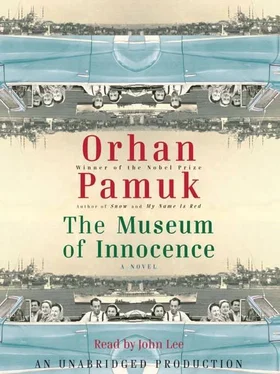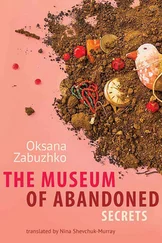In later years these cinema gardens would disappear-the mulberry and plane trees would be chopped down, replaced with apartment buildings or turned into parking lots, or mini football fields covered with AstroTurf; but in those days, each time I set eyes on these mournful places-surrounded by whitewashed walls, little factories, teetering old wooden houses, and two-or three-story apartments with too many balconies and windows to count-I was shocked by how crowded they were. Intermingled in my mind with the drama on the screen was the lively humanity I sensed in all those big families, the mothers in their headscarves, the chain-smoking fathers, the soda-sipping children, the single men, the barely suppressed fidgetiness of these people munching disconsolately on their pumpkin seeds as we watched the film, almost always a melodrama.
It was on one such screen in a gigantic open-air cinema that I first saw Orhan Gencebay, who with his songs and his movies, his records and his posters, was becoming a fixture in the lives of the entire Turkish public at that time-the king, in fact, of music and domestic film. The cinema was on a hill behind the new shantytowns between Pendik and Kartal, overlooking the Sea of Marmara, the sparkling Princes’ Islands, the factories, large and small, whose walls were covered with leftist slogans. The smoke, which looked even whiter by night, rising like puffs of cotton from the chimneys of the Yunus Cement Factory in Kartal had covered the entire area in white ash, and together with the plaster dust falling onto the audience produced an effect like snow in a fairy tale.
In this film Orhan Gencebay played a poor young fisherman named Orhan. There was a rich, evil man who was his patron, to whom he felt indebted. This patron’s spoiled son was even worse, and when the boy and his friends happened upon the girl played by Müjde Ar (who was just making her first films at the time) and raped her, mercilessly and at length, tearing off her clothes to give us a better view, the audience fell silent. Under pressure from his patron, to whom he felt so indebted, Orhan was then obliged to whitewash the whole affair by marrying Müjde. At this point, Gencebay cried out, “Down with the world, down with everything!” and once again he would sing the song he had made famous throughout Turkey.
During the film’s most affecting scenes, we would hear nothing but a rustling noise coming from the hundreds of people seated around us, munching pumpkin seeds (the first time I heard this, I thought it was coming from some machine in a nearby factory). Whenever I heard this sound, I felt as if we had all been abandoned to sorrows gathering up within us for many years. But the film’s ambience, the jostling of people who had come out to have a bit of fun, the wisecrackers in the section for single men at the front, and, of course, the implausible plot elements all hindered my ability to let myself go and luxuriate in my suppressed fears. But when Orhan Gencebay cried out in anger, “All is darkness, where is humanity?” I was very happy to be sitting in that cinema, among the trees and under the stars, with Füsun at my side. While I kept one eye on the screen, with my other I watched how Füsun squirmed in her blue jeans, in her wooden chair, how her chest rose and fell with each breath, and how, as Orhan Gencebay cried, “My destiny be damned!” she crossed those legs. I watched her smoke, and wondered how much she shared in the passions on-screen. When Orhan was forced to marry Müjde, and his angry song took on rebellious tones, I turned to Füsun, smiling with a look both impassioned and arch. But, caught up in the film, she didn’t even turn to look at me.
Because his wife had been raped, Orhan the fisherman did not make love with her-he kept his distance. When she understood that her pain would not be assuaged by this marriage, Müjde attempted suicide; Orhan took her to the hospital and saved her. The most emotional scene was on the way back from the hospital, when he told his wife to take his arm, and Müjde turned to him and asked, “Are you ashamed of me?” It was then that I finally felt an intimation of the shame that had remained buried inside me. The crowd had fallen into a deathly silence, aghast at the shame of marrying and walking arm in arm with a woman who had been raped, her virginity stolen.
My own shame was compounded by anger. Was I embarrassed that virginity and chastity were being discussed so openly, or because I was watching this with Füsun? As these thoughts passed through my mind, I could feel Füsun fidgeting in her chair. The children sitting in their mothers’ laps had fallen asleep, and the angry youths in the front row had stopped making wisecracks at the heroes and had grown quiet, and Füsun, seated next to me, put her right arm behind her chair-how I longed to hold it!
The second feature gave the shame inside me a new shape, casting it as the ailment that afflicted the entire country, and even the stars in the sky: the pain of love. This time Orhan Gencebay had dark, sweet Perihan Savaş at his side. In the face of unbearable pain, he showed no anger, rather availing himself of those other, greater weapons that we all possess-humility and forbearance-summarizing his feelings, and the film, in this song, which the museum visitor can have the pleasure of listening to:
Once you were my sweetheart
I yearned for you even when you were near
Now you’ve found another love
May happiness be yours
And mine the trials and troubles
Let life be yours, be yours .
By now all the children were asleep on their parents’ laps, and the rowdy, soda-swilling, chickpea-throwing boys in the front rows had fallen silent-was it owing to the lateness of the hour or to the respect they felt for Orhan Gencebay in transforming the pain of fear with sacrifice? Could I do likewise and live without further misery or humiliation, just by wishing for Füsun’s happiness? If I did all that was necessary for her to star in a Turkish film, would I find peace?
Füsun’s arm was no longer close to me. When Orhan Gencebay told his sweetheart, “May happiness be yours, and may the memories be mine!” someone at the front yelled “You fool!” but almost no one laughed approval. We were all silent. That was when it occurred to me that the lesson this country had learned or yearned to learn, above all others, the skill we most wanted to master and pass along, was that of gracefully accepting defeat. The film had been shot in a Bosphorus yalı , and perhaps because it awakened memories of last summer, and last autumn, for a brief time I felt a lump in my throat. Just off the coast of Dragos a white ship was slowly advancing across the Sea of Marmara toward the sparkling lights of the Princes’ Islands where happy people were summering. Lighting a cigarette, I crossed my legs and gazed at the stars, dazzled by the beauty of the universe. I had been drawn into this film, coarse as it was, by the audience’s hushed response. If I had been watching the film at home alone on television, it would not have affected me so, and had I been sitting with my mother, I would not have watched it to the end. It was only because I was sitting next to Füsun that I felt the bond of fellowship with the rest of the audience.
When the lights went up we were as quiet as the mothers and fathers bearing sleeping children in their arms; not once did we break this silence on our return journey. As Füsun dozed in the backseat, her head resting on her husband’s chest, I smoked a cigarette and gazed through the window at the somber streets, the little factories, the shanty towns, the youths defacing walls with leftist slogans under cover of darkness, the trees that looked so much older at night, the aimless packs of dogs, and the tea gardens about to close, while Feridun whispered to me his good-natured analysis of the film’s key moments, which I never once turned my head to acknowledge.
Читать дальше












